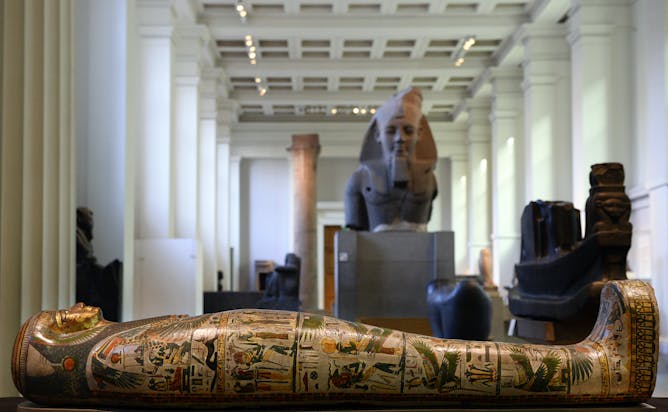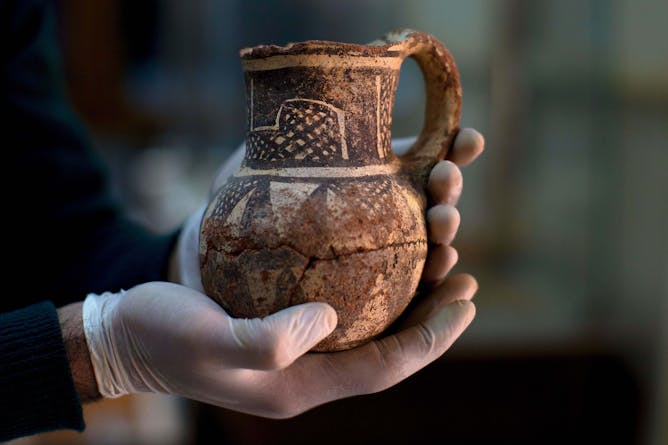|
Every year on May 18 the International Council of Museums drums up support for museums around the world. It says museums are important because they enable cultural exchange, enrich cultures and help develop mutual understanding, cooperation and peace. Do they, in fact, do all these things? Not always, argues Yirga Gelaw Woldeyes. The fact is that many Western museums continue to display artefacts taken from Africa. It’s time they seriously considered returning them.
Elsewhere Fiona Greenland, James Marrone, Oya Topçuoğlu and Tasha Vorderstrasse examine how Syria’s archaeological heritage has been ransacked by the Islamic State.
|

A mummy of the Ancient Egyptian Priestess “Tamut” (900 BC) on display at British Museum in London, in 2014.
EPA/Facundo Arrizabalaga
Yirga Gelaw Woldeyes, Curtin University
The power to select, name and decide the meaning of these items makes Europeans the authors of African history.
|

A Syrian archeologist holds an artifact that was transported to Damascus for safe-keeping during the Syrian Civil War.
AP Photo/Hassan Ammar
Fiona Greenland, University of Virginia; James Marrone, Johns Hopkins University; Oya Topçuoğlu, Northwestern University; Tasha Vorderstrasse, University of Chicago
According to a new study, a small portion of a site can yield thousands of objects, adding up to millions of dollars.
|
Business + Economy
|

Astrid R.N. Haas, International Growth Centre
Africa is home to the world's fastest growing cities. However, poor governance has robbed the continent of the benefits of people and firms clustering together.
| |

Smriti Sharma, Newcastle University
As India grapples with boosting the number of jobs available to people, it must ensure it does not leave women behind.
|
|
|
Science + Technology
|

Robert Merkel, Monash University
Two security scares in the past 24 hours should prompt you to make sure your software is up-to-date. But what are the risks?
| |

Oana Goga, Université Grenoble Alpes
Rather than revealing an advertiser targeted you by your phone number or email address, Facebook may tell you it showed you a particular ad because you like Facebook. That's not much help.
|
|
|
En Francais
|

Didier Courbet, Aix-Marseille Université (AMU); Marie-Pierre Fourquet-Courbet, Aix-Marseille Université (AMU)
À la veille des Journées européennes de l’obésité, zoom sur un facteur de risque du surpoids relativement méconnu et qui, pourtant, nous concerne tous : le temps passé devant les écrans.
| |

Stéphane François, École pratique des hautes études (EPHE)
En 2018, les idéologues de l’extrême droite utilisent avec succès Internet en entretenant une confusion des genres et des idées, favorisée par la méfiance à l’égard des médias « traditionnels ».
|
|
|
Arts + Culture
|
-
Pierre Raffard, Sorbonne Universités
While thought of as an unpretentious fast-food dish, the doner kebab is a symbol of the social, political and identity issues facing European society today.
|
|